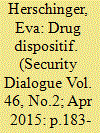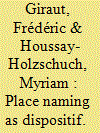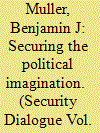| Srl | Item |
| 1 |
ID:
138072


|
|
|
|
|
| Summary/Abstract |
International relations and critical security studies are increasingly including the role of materiality in the study of security practices, inquiring into how objects act as both threat and /or endangered referent. However, objects of ‘dual-use’ – that is, objects that are not only threatening or in need of protection but also beneficial or pleasurable to the human collective – figure less prominently. Drugs are such an ambivalent matter: beneficial in the context of medicine and at the same time threatening in the context of crime. Mobilizing the concept of the dispositif, this article questions how drugs and addiction materialize in the practices of the global drug prohibition regime. I argue that the ambivalence of the material object ‘drug’ is the condition of possibility of the regime. The regime as an epitome of the ‘drug dispositif ’ illustrates how ambivalent objects give rise to expanding security practices and specific power relations, highlighting how (critical) security analyses could profit from greater awareness of ambivalent matters.
|
|
|
|
|
|
|
|
|
|
|
|
|
|
|
|
| 2 |
ID:
145412


|
|
|
|
|
| Summary/Abstract |
Recent critical toponymies have convincingly demonstrated that studying place names also reveals much about geopolitics and power relations. In this paper, we propose a theoretical framework for interpreting these toponymies, in order to better decipher, theorise, and compare the many very rich case studies in the field. Our first argument is that the focus of enquiry should be place naming processes rather than place names themselves. We then show that place naming is a dispositif in the Foucauldian sense. This allows us to build a framework that distinguishes between (a) four types of geopolitical contexts, from which place naming processes tend to stem; (b) four types of technologies that are commonly used; and (c) three types of actors. Lastly, we identify the preferential combinations and nexuses between these building blocks of place naming contexts, technologies, and actors.
|
|
|
|
|
|
|
|
|
|
|
|
|
|
|
|
| 3 |
ID:
081453


|
|
|
|
|
| Publication |
2008.
|
| Summary/Abstract |
What is the relationship between popular culture and the reliance on risk management as a framework for governance in the emerging security dispositif? Furthermore, how is one to understand the influence of culture and cultural forces in relation to the emerging biometric state and the alleged security imperatives therein? This article contends that the emerging security dispositif, and the associated imaginations and cultural performances that sustain and shape it, are vital to the production of what is referred to here as the `biometric state'. Motivated by an obsession with technologies of risk and practices of risk management, the biometric state is defined by the prevalence of virtual borders and reliance on biometric identifiers such as passports, trusted-traveller programmes and national ID cards, as well as the forms of social sorting that accompany these manoeuvres. Raising the marriage of convenience that connects two related dispositifs of security - geopolitics and biopolitics - the article considers the relationship between their referent objects: the state and everyday life, respectively. More specifically, popular culture integral to sustaining the emerging security dispositif forms the core of the analysis, as the article asserts the constitutive possibilities of popular culture
|
|
|
|
|
|
|
|
|
|
|
|
|
|
|
|